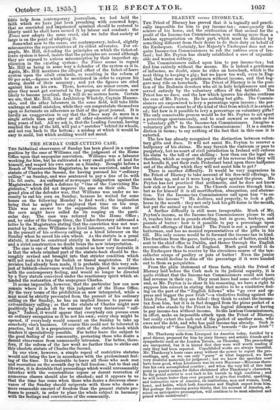THE SUNDAY CORN-CUTTING CASE.
THE Sabbatical observance of Sunday has been placed in a curious position by the case of Williams and the judgment of the Home Office upon that unpopular conviction. Williams was a labourer working for hire, but he cultivated a very small patch of land for himself, and reaped his own corn on a Sunday. Brought before a Bench of Worcestershire Magistrates, he was convicted, under the statute of Charles the Second, for having pursued his "ordinary calling" on Sunday, and was sentenced to pay a fine of 5s. with 12s. 6d. costs. An outburst of newspaper indignation against the Magistrates drew forth a defence by " One of the Convicting Ma- gistrates," which did not improve the case on their side. The grand plea of the defender was, that Williams was under no ne- cessity to cut his corn on Sunday, because he waited for some hours on the following Monday to find work; the implication being that he might have employed that time on his crop. This was no answer to the supposition that the state of the corn might have called for its reaping on the parti- cular day. The case was referred to the Home Office ; and, by order of Sir George Grey, the Under-Secretary addressed a letter to the Magistrates stating that the conviction was not war- ranted by law, since Williams is a hired labourer, and he was not in the pursuit of his ordinary calling as a hired labourer on the Sunday when he saved his own wheat. As the statute is a penal statute, it must be construed strictly in favour of the accused ; and a strict construction no doubt bears the new interpretation.
The case is one of those which remind us how very desirable it is that the whole criminal part of the statute-book should be tho- roughly revised and brought into that stricter condition which will not make it a trap for foolish or biased magistrates. If the revision had already been made, it is probable that this very sub- ject of Sabbath-observance would have been placed in accordance with the contemporary feeling, and would no longer be directed by a Tory statute conceived under the reactionary spirit which at- tended the restoration of the scapegrace Charles. It seems impossible, however, that the particular law can now
.remain where it is left by this judgment of the Home Office. By the very terms of the prohibition as now interpreted, while a man must be strictly prevented from the pursuit of his ordinary calling on the Sunday, he has an implied licence to pursue an extraordinary calling ; so that the statute of Charles might now positively be pleaded as the warrant for very fantastical " call- ings." Indeed, it would appear that everybody can pursue even an ordinary occupation so it be not his own ; every shop might be opened, if everybody would consent on the Sunday to take up somebody else's business. Of course this could not be tolerated in practice, but it is a preposterous state of the statute-book which renders it speculatively possible. Far better leave the subject to the good feeling of the community, protecting those who desire a decent observance from unmannerly intrusion. Far better, there-
. fore if the reform of the law went no further than to strike out this obsolete statute of Charles the Second.
In our:view, however, a simple repeal of restrictive statutes would not bring the law in accordance with the predominant feel- ing of the time. It is desirable to leave all those who seek rest and recreation on the seventh day in full freedom ; but to that end likewise, it is desirable that proceedings which would unreasonably interfere with the conscientious repose or decent recreation of numerous classes should also be oheoked ; and it appears to us 'that the time has come when those who desire a decorous obser- . Vance of the Sunday should cooperate with those who desire a more reasonable amount of freedom than the present statute pro- fesses to permit, in order to place the whole subject in harmony with the feelings and convictions of the community.


























 Previous page
Previous page